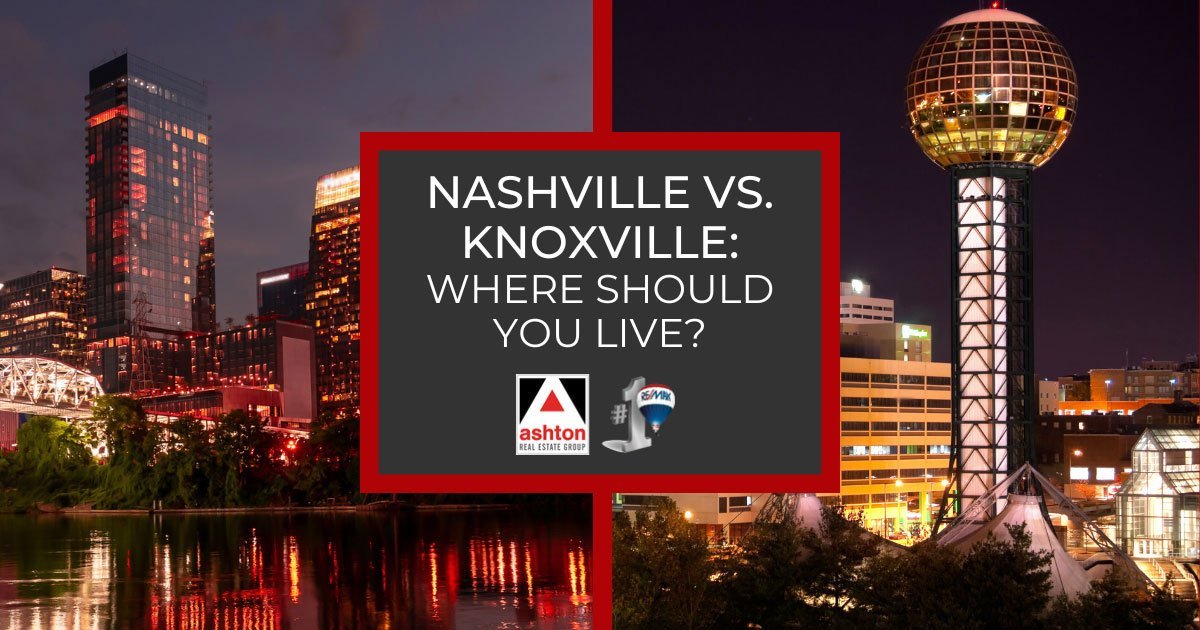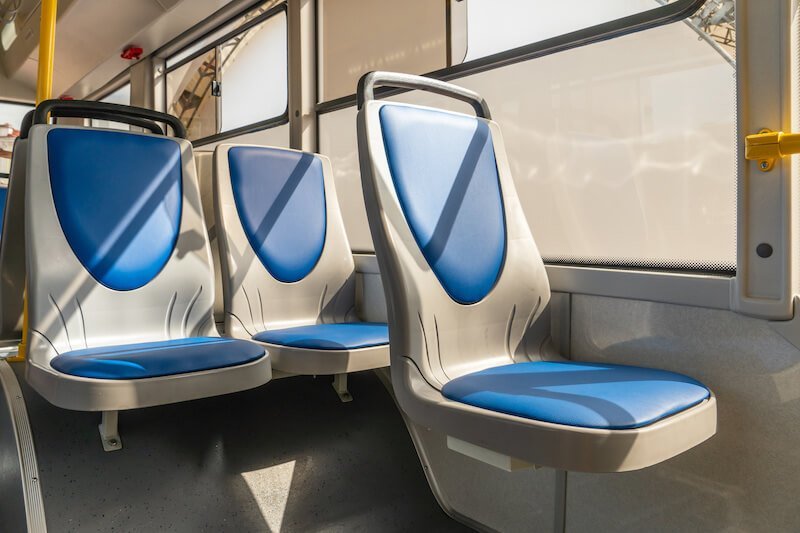
Are you trying to decide between living in Nashville or Knoxville, Tennessee? These vibrant cities offer diverse opportunities for residents. Nashville, often dubbed "Music City," boasts a thriving music scene and a bustling urban environment.
Nashville's music culture and job market may appeal to those seeking excitement and career opportunities. Knoxville, on the other hand, provides a quieter lifestyle and natural beauty. Both cities have their unique charm, so choosing one depends on your preferences. Whether you're drawn to lively rhythm or serene beauty, get ready to explore the pros and cons of Knoxville vs. Nashville to help you make an informed decision.
Nashville Economy vs. Knoxville Economy
Dollars and cents are always a big concern when picking a new hometown. Both Nashville and Knoxville offer advantages and drawbacks when it comes to their economies, reflecting their histories and future potential growth.
Cost of Living
There's no doubt that the value of a dollar goes further in Knoxville compared to Nashville. Overall, Nashville is slightly above the national average cost of living, while Knoxville is significantly lower, closer to Tennessee's statewide cost of living.
Most estimates peg the cost of living in Nashville at 10%–15% higher than in Knoxville. Housing prices are the leading cause of this, with the convenience and big city amenities leading to higher values for homes in Nashville (with a median in the mid-$400s), while Knoxville offers more affordable though still high-quality homes, with Knoxville homes averaging in the mid-$300s. Rentals in Nashville are similarly pricier.
However, both cities provide housing across a broad price spectrum, making this the most flexible part of the cost of living. Utility costs are slightly higher in Nashville, though both cities are near or below national rates. Other costs are typically slightly elevated in Nashville compared to Knoxville, from groceries to healthcare to transportation, though all are fairly close to national and statewide averages.
Job Market

Those looking for a job in either Nashville or Knoxville may not have to look far. Both have seen consistent job growth in recent years in the low to mid-single-digit percentages, among the strongest in the state. In addition, unemployment in both cities is below the national rate.
However, Nashville comes out on top in this matchup for numerous reasons. Primarily, it's a far larger job market, producing a diverse mix of jobs not found in smaller cities like Knoxville.
Higher salaries and wages are another major perk of the Nashville job market, with averages in the high $50s to mid-$60s, compared to the mid-$40s to low $50s in Knoxville. Both abide the federal minimum wage of $7.25 per hour.
Top Industries & Biggest Corporations
Nashville and Knoxville each offer strengths in specific industries and for certain types of employees. Nashville is home to numerous healthcare companies and hospital systems, earning it the title "Health Services Capital of the United States." These companies, like Vanderbilt University Medical Center and HCA Healthcare, are among Nashville's most significant single employers. The city is also known for its thriving entertainment scene, still considered the center of the country music world. Finance and education are also major contributors, as is a growing tech sector. In addition, car companies Nissan and General Motors are among the most significant local employers.
On the other hand, Knoxville's largest employer is the U.S. government via its Department of Energy facilities at Oak Ridge National Laboratory and other sites. Healthcare is also prominent, as is manufacturing and logistics, thanks to the city's location near several major interstates.
Both cities have strong tourism industries, celebrating country music and the Smoky Mountains, as well as jobs linked to prominent educational institutions like the University of Tennessee, Tennessee State University, Vanderbilt University, and more.
Overall, would-be residents will need to consider their finances, skills, and circumstances when sizing up the economy of these two cities. While Nashville offers higher salaries and a larger, more diverse job market, Knoxville provides a more affordable cost of living and unique employers and jobs not found elsewhere.
Nashville Commutes vs. Knoxville Commutes
Compared to many large cities, commuting in Nashville and Knoxville can be relatively short and stress-free. However, some critical differences between them could tip the scales for potential new residents.
Traffic Patterns and What to Expect
In some ways, Nashville and Knoxville share similarities in their commuting, with the majority of residents driving to work on their own. Both rely on a useful network of interstates and highways, including Interstates 24, 40, and 65 in Nashville and Interstates 40 and 75, along with several U.S. highways around Knoxville. Both cities also see fairly typical rush hour patterns, peaking in the 7 to 9 a.m. range and again in the afternoon between 4 and 7 p.m.
However, Nashville's traffic is generally considered to be worse than Knoxville's. This is partly due to Nashville's far larger population, more than three times that of Knoxville, and the city's rapid growth in recent years. Still, on average, Nashville commuters drive about 25 minutes each way to work, only about five minutes more per trip than Knoxville. But significantly more Knoxville residents commute under 15 minutes, while significantly fewer spend 45 minutes or more per trip.
Public Transportation

Public transportation (along with commuting on foot or by bike) is relatively uncommon in Knoxville but still available for those looking to get around without a car.
Nashville's public transit options are more wide-ranging than Knoxville's, offering both bus and commuter rail service operated by WeGo Transit. Buses span the city and immediate surrounding area (including suburban park-and-ride lots), with a higher concentration of routes near downtown.
Knoxville also has public transportation options run by Knoxville Area Transit. This bus-only service is more limited but provides a way to travel through downtown and some outlying areas of the city. It also runs additional services for football games or large events at the University of Tennessee.
Best Suburbs in Each City for Short Downtown Commutes
While the city cores offer many benefits for some residents, people who'd prefer a more suburban lifestyle have excellent options around Nashville and Knoxville.
Nashville includes a ring of desirable towns to the south and east, including Belle Meade, Brentwood, Franklin, Smyrna, and Nolensville, many of which offer charming downtowns of their own alongside other local amenities. All are within a 30–40 minute drive from downtown under normal traffic conditions. Some other Nashville suburbs with short downtown commutes include Lebanon and Lockeland Springs.
Knoxville also has popular suburbs in its metro area, which stretches southwest from downtown along the Tennessee River. Farragut, Oak Ridge, Maryville, Alcoa, and several others provide the best choices within 30 minutes, while the popular small town of Pigeon Forge in the foothills of the mountains is also less than an hour away.
When comparing these two areas based on commutes, it comes down to preference and commuting plans. Nashville offers more big-city transportation amenities but often has a slightly longer commute time. Knoxville is more car-dependent, but residents spend less time on average getting to and from work. Both have plentiful options for nearby suburbs, suitable for most tastes and budgets.
What to Do in Nashville vs. What to Do in Knoxville
Keeping busy and having fun is easy in Nashville and Knoxville, but the bigger city (and capital of Tennessee) naturally has more going on than the smaller Knoxville.
This includes famous Nashville attractions like the Country Music Hall of Fame and Museum, Grand Ole Opry, a variety of other iconic country music locations around town and in the Music Row neighborhood, as well as a group of highly-rated museums.
Knoxville is also known for popular museums, as well as its Market Square neighborhood, which serves as the heart of town and is lined by bars, restaurants, shops, and other attractions.
Outdoor Activities
There's plenty to do for those who enjoy getting outdoors in both of these green-friendly cities.
Despite Nashville's highly developed character, it's still the site of numerous beloved parks, including Centennial Park, the location of the well-known replica of the Parthenon, and Bicentennial Capitol Mall State Park, which pairs beautifully landscaped green space with Tennessee history.
Along the Cumberland River, residents can relax or stroll the walking paths at Riverfront Park, while those willing to make the less than 10-mile trip out of town will fall in love with Radnor Lake State Park, a nearly 1,400-acre oasis of greenery, lakes, and creeks.
Knoxville's less developed surroundings may be a better fit for those who enjoy a wilder outdoor experience. Within the town, there's World's Fair Park, the site of the 1982 World's Fair that's since been repurposed with green space, an amphitheater, and the famous Sunsphere observation tower.
Western Knoxville is home to Victor Ashe Park, known for its sports facilities, golf course, and playground. There's also the well-known Ijams Nature Center across the Tennessee River, which provides space for hiking, biking, swimming, paddling, and even rock climbing.
Of course, Knoxville's biggest outdoor draw is its place among the Smokies, less than an hour's drive from Great Smoky Mountains National Park. This breathtaking, world-famous area provides countless hiking, camping, fishing, horseback riding, and nature-viewing opportunities.
Sports

Lovers of live sports have great choices in both towns, though Nashville is unquestionably the top dog. Music City is home to two major pro sports franchises. The NFL's Tennessee Titans play at Nissan Stadium just across the Cumberland River from downtown, while the NHL's Nashville Predators call SoBro's Bridgestone Arena home. Residents can also check out MLS's Nashville SC and the Triple-A Milwaukee Brewers minor league baseball affiliate, the Nashville Sounds.
While Knoxville may not play host to any pro teams, college football lovers surely know it as the home of college football's Tennessee Volunteers, who draw tens of thousands of fans to games every fall.
In addition to other college sports, the area also offers minor league baseball in nearby Kodak from the Tennessee Smokies, Double-A Chicago Cubs affiliate. There's also the Knoxville Ice Bears, who play in the independent hockey league SPHL.
Both Nashville and Knoxville have extensive options for rec-league and other casual sports, along with many fields and facilities, for those who'd rather participate than watch.
Nightlife
It should come as no surprise to most that Nashville has a far more extensive, more diverse, and sometimes rowdier nightlife scene than Knoxville. It's centered around Lower Broadway, the iconic strip of honky-tonks, bars, nightclubs, and other spots like the famous Tootsies Orchid Lounge and Robert's Western World. “Honky-Tonk Highway” is undoubtedly one of the best places to visit in downtown Nashville.
Numerous live music venues are downtown or nearby, including the Ryman Auditorium and Ascend Amphitheater. Meanwhile, Nashville also boasts a sophisticated and growing restaurant scene, with many options based in the Germantown neighborhood.
However, Knoxville holds its own for a city of its size, thanks in part to the demand created by students and recent grads from the University of Tennessee. The highest concentration of restaurants, bars, clubs, music venues, and other nightlife spots are found in the downtown and Old City neighborhoods, including the popular Stock & Barrel and Clancy's Tavern and Whiskey House.
Overall, while Nashville may offer more attractions, sports, nightlife, and other things to do, Knoxville certainly doesn’t come up short, especially when accessing the beautiful outdoor areas of Eastern Tennessee.
Which City in Tennessee is Best For You?
Ultimately, the choice between these two cities boils down to your personal preferences and what you value most in a community. Will it be Nashville, home to 650,000+ residents and legendary entertainment? Will it be Knoxville, with nearly 200,000 people, a more affordable price tag, and the Smoky Mountains at your doorstep? Make the decision that aligns with your lifestyle and aspirations, and you'll find the ideal place to call home in the heart of Tennessee.
If the opportunities of Nashville excite you, contact The Ashton Real Estate Group of RE/MAX Advantage with Nashville's MLS at (615) 603-3602 to get in touch with local real estate agents who can help find the perfect Nashville home for you today.



